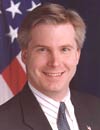Charles Blahous

Charles Paul "Chuck" Blahous III (born 1963) is a research fellow at Stanford University's Hoover Institution, specializing in domestic economic policy, a U.S. public trustee for the Social Security and Medicare programs,[1][2] and a former (2001–2007) Special Assistant to US President George W. Bush for Economic Policy within the National Economic Council whose Deputy Director he was in 2007-2008. He lives in Rockville, Maryland.
Blahous was born in 1963 in Alexandria, Virginia, United States, the second of three children of Charles Paul Blahous II of Czech descent and Marjorie Alice Robertson of Scot/English ancestry. He was raised in Pittsburgh, Pennsylvania and received an undergraduate degree in chemistry from Princeton University in 1985, and a Ph.D. in computational quantum chemistry from the University of California, Berkeley in 1989.
Between 1989 and 1996, Blahous worked as a legislative aide to Senator Alan Simpson of Wyoming; he was his Congressional Science Fellow in 1989-1990 and Legislative Director in 1994-1996 (sponsored by the American Physical Society). After Simpson's retirement, Blahous served from 1996 to 2000 as a Policy Director for Senator Judd Gregg of New Hampshire. From June 2000 through February 2001 he served as the Executive Director of the Alliance for Worker Retirement Security. From 2001 to 2007, he served as a Special Assistant to the President for Economic Policy, during which time he also served as Executive Director of the bipartisan President's Commission to Strengthen Social Security.[3] He helped create President George W. Bush’s failed plan to let people put some of their payroll taxes into personal retirement accounts.[4] From 2007 to 2008, he held the position of the Deputy Director of the National Economic Council. After the end of George W. Bush's second term in office in January 2009, Blahous joined the Hudson Institute as a Senior Fellow.[5] In 2010, Blahous left the Hudson Institute and became a Research Fellow at the Hoover Institution.[6]
His ideas about Social Security reform issues are explained in Reforming Social Security for Ourselves and Our Posterity, a book he published in September 2000. Blahous' second book, Social Security: The Unfinished Work, was published by Hoover Institution Press in November 2010, and a third, Pension Wise: Confronting Employer Pension Underfunding - And Sparing Taxpayers the Next Bailout, was released by the same publisher in December 2010.[7]
In the 2016 hearings of the Senate Finance Committee, Democrats opposed his second term as public trustee of Social Security, because, they said, he undermined public confidence in the program by exaggerating its problems. Sen. Elizabeth Warren (D-MA), said he was “an anti-government zealot.” Sen. Chuck Schumer (D-NY), said that his academic career shows that he is “personally ideologically opposed to the fundamental promise of Social Security.” The committee voted to recommend reconfirmation by 14-12, with all Democrats voting against him.[4][8]
Apart from politics, he is also a member of the Society for American Baseball Research and has published several articles on baseball in renowned American baseball journals. His publications cover also federal entitlements, demographics and chemistry.
In 2012, he co-authored an article with Jason J. Fichtner entitled 'Social Security Reform and Economic Growth' in The 4% Solution: Unleashing the Economic Growth America Needs, published by the George W. Bush Presidential Center.
References
- ^ President Obama Announces Intent to Nominate Charles Blahous as Member of the Board of Trustees of the Social Security Trust Funds | The White House
- ^ Change at the National Economic Council: What Does It Mean? | e21 - Economic Policies for the 21st Century
- ^ Personnel Announcement as Executive Director of the President's Commission to Strengthen Social Security at whitehouse.gov
- ^ a b Driven by Campaign Populism, Democrats Unite on Expanding Social Security, By ROBERT PEAR, New York Times, JUNE 18, 2016
- ^ Outgoing Deputy Director of the National Economic Council Chuck Blahous to Join Hudson Institute Archived 2011-06-13 at the Wayback Machine
- ^ Charles Blahous Bio at the Hoover Institution
- ^ Charles Blahous Author Page on Amazon.com
- ^ Has President Obama appointed a fox to guard the Social Security henhouse? Michael Hiltzik, Los Angeles Times, May 10, 2016
External links
- Blahous' bio at the Mercatus Center
- Hudson Institute Biography for Chuck Blahous
- Hoover Institution Biography for Charles Blahous
- Appearances on C-SPAN
- Biography of Charles P. Blahous at whitehouse.gov (archival copy)
- Biography from The Wall Street Journal at PolicyBytes.org
- Template:Goodreads author
- United States presidential advisors
- Princeton University alumni, 1980–89
- University of California, Berkeley alumni
- American people of Czech descent
- 1963 births
- Living people
- American people of Scottish descent
- American people of English descent
- George W. Bush administration personnel
- People from Alexandria, Virginia
- George Mason University faculty
- Virginia Republicans
- Maryland Republicans
